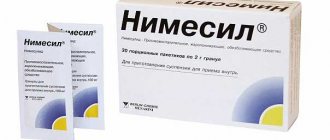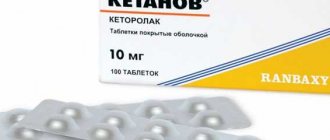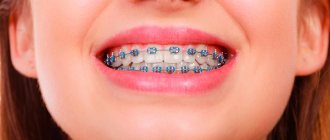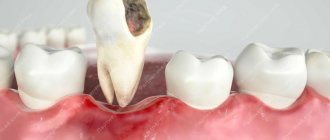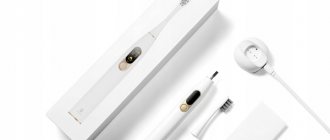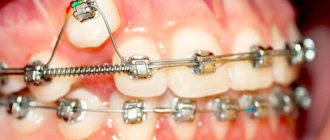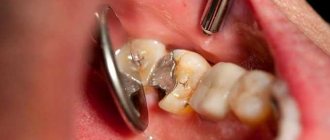Analgin is a common analgesic that is often used to reduce pain. Analgin is especially often used during acute toothache. Despite the presence of a large number of side effects and contraindications, it is used for almost any unpleasant sensation. This is due to the fact that this drug is available in almost all pharmacies and can be purchased without a doctor’s prescription. But still, you first need to study all the features of this medicine.
Pharmacological properties
Analgin is a non-steroidal anti-inflammatory drug, the main purpose of which is to suppress the production of prostaglandins, which are responsible for pain. Prostaglandins provoke inflammation, as a result of which an impulse is sent to the brain, expressed in the form of severe pain.
You can relieve acute toothache by taking analgin tablet, but this help is temporary.
It is necessary to contact a dentist. Many dentists note that with severe aching pain in the teeth, analgin does not always help; it can only reduce mild pain. This remedy has the greatest antipyretic and anti-inflammatory effects. For this reason, in case of serious dental pathological processes, during which severe pain and inflammation are observed, there is no point in hoping that Analgin will be able to reduce their intensity. In these cases, this remedy is weak and often does not reduce pain and inflammation. It is best to consult a doctor who will provide appropriate treatment.
The effect of Analgin is observed 20-40 minutes after administration. Maximum therapeutic effectiveness occurs after 2 hours. Despite the fact that the drug is low in effectiveness and can only reduce mild pain, its effect can last for 5-6 hours.
Excretion occurs mainly through the kidneys along with urine. Excreted in the form of metabolites. The bioavailability level is 90%.
General recommendations
Regardless of the chosen method of getting rid of toothache, you should follow simple rules:
- Brush your teeth thoroughly with toothpaste and use dental floss. Inflammation could occur due to food stuck between the teeth, removing which can provide tangible relief.
- Try to eat only liquid or soft foods. Excessive pressure on the disturbing tooth will increase the pain syndrome, and the entry of food particles into carious areas will lead to the active development of the inflammatory process.
- The tooth should not be heated. Increased blood circulation will irritate the nerve endings, which will increase the pain. In addition, heat will increase suppuration and other complications.
- Try to distract yourself and not think about the symptom. You can concentrate on work, hobbies or watch a TV series.
Important! Don't give up brushing your teeth. Otherwise, this will provoke active growth of pathogenic microflora, which will aggravate inflammation and increase pain.
Painkillers
Painkillers that are always in your home medicine cabinet effectively relieve pain:
- Analgin is an inexpensive drug that does not require a prescription. The main remedy for getting rid of aching toothache. You cannot apply the tablet to a sore tooth, as analgin eats away the enamel.
Advice. Soak a cotton swab in Valocordin or dip it in crushed Validol. Apply the swab to the painful tooth for 15 minutes.
- Spasmalgon is a stronger analgesic. A single dose should not exceed 2 tablets, and a daily dose should not exceed 6.
These medications should not be taken by pregnant women, nursing young mothers, or children. Taking such medications is incompatible with alcohol. Read the instructions carefully, as there are serious contraindications for disorders of the liver, circulatory system and kidneys.
- Paracetamol is effective for moderate pain. In small doses it has the least negative effect on the body and can be used to help a child get rid of toothache.
Attention! Always read the instructions for medications carefully and follow the dosage to avoid side effects.
Remember that tablets as a way to get rid of toothache do not cure, but only temporarily relieve pain.
In what forms is it available?
Analgin can be produced in different forms, so when choosing, you can take into account any convenient method of use. In pharmacies this remedy is found in the following forms:
- In the form of tablets. The tablets are usually round in shape and white in texture. Tablets are placed in cell blisters of 10 pieces
- In the form of capsules. The capsules are oval in shape. Capsules are placed in cell-type blisters. A cardboard box contains two blisters
- In the form of a solution in ampoules for injection. The solution has a transparent structure. One cardboard package contains 10 ampoules
- In the form of suppositories for rectal administration
How to take during toothaches
Important! Before you start taking the drug Analgin during toothaches, it is worth finding out for what disorders it can be used.
Analgin is usually prescribed to reduce pain in the following dental pathological processes:
- When the process of carious tooth decay occurs
- In the presence of chips and microcracks in tooth enamel
- During pulpitis
- Inflammatory processes in the gums
- Inflammatory process at the root of the tooth
- In the presence of cystic formations
- Upon penetration of an infectious lesion
It is worth considering that Analgin has an acidic environment, so it is not recommended to apply the tablets to the tooth. Of course, when used this way, the product will relieve discomfort, but as a result it can corrode the enamel.
Taking analgin, applying it directly to the tooth, can harm the enamel
This will be especially pronounced in the presence of cracks and in the initial stages of caries. As a result, the hole in the tooth may become even larger.
Bottom line
If you have a slight toothache (aching), you can do the following:
- take an aspirin capsule and drink a glass of water;
- give an injection of aspirin solution;
- light candles (for a child);
- drop drops (infant).
In case of severe pain and significant destruction of the tooth crown, crush the tablet into powder, dilute with a drop of water and place in a hollow. If there is an inflammatory process in the gum, place it on the swollen area. In addition to this, you need to take the capsule orally. Then you need to make an appointment at the dental office for treatment.
Painkillers provide only temporary relief, masking the pain syndrome. While taking analgesics, a person does not feel pain, however, pathological processes continue to develop. With repeated use of painkillers, the processes of destruction in tissues can become irreversible, and a person can expect long-term, expensive treatment.
The principle of action of analgesics is based on the relief of pain signals from the site of inflammation to the brain. However, the temporary disappearance of pain does not mean that the body is healing: it needs targeted therapy.
It should be remembered that the simultaneous use of the drug with other analgesics is prohibited: this will increase the toxicity of analgin. This combination of drugs is especially dangerous when treating infants: unforeseen complications may arise.
Sources:
- https://stomatologliliya.ru/sredstva/analgin-ot-zubnoj-boli-cherez-skolko-dejstvuet-i-kak-ego-prinimat
- https://stomatology-portal.ru/zuby/bol/mozhno-li-klast-analgin-na-bolnoj-zub
- https://doverie-stomatolog93.ru/lechenie/analgin-na-zub-ot-boli.html
- https://zub.guru/lekarstvennye-sredstva-v-stomatologii/pomogaet-li-analgin-ot-zubnoy-boli.html
- https://stomatologiya48.ru/sredstva/mozhno-li-analgin-pri-zubnoj-boli.html
- https://stom-gorpark.ru/implantatsiya/analgin-pri-zubnoj-boli-mehanizm-dejstviya-i-sposoby-primeneniya.html
Rules for internal use
When toothache occurs, Analgin can be used in different ways. It all depends on the form of release of the medicine:
- You can take a tablet, in addition you can drink it with water
- Pain can be reduced by applying the tablet to the sore spot
- Injection of solution
- Using rectal suppositories for a child
The most commonly used are tablets or capsules. This form of the drug is easiest to take. However, the period of action will be slightly longer than when used in the form of injections or suppositories. After taking one tablet, the effect begins only after 30-40 minutes. 3-4 doses per day are allowed. It is recommended to take each tablet every 4 hours.
You can apply the tablet to the sore spot. When used this way, the effect occurs almost instantly. However, the effect will be short-lived. Also, do not use if you have caries.
Using the drug in injection form can reduce pain almost instantly. But at home, such use will not always be convenient, because not everyone can give injections. In addition, it will be quite difficult to calculate the dosage.
What can you take instead of analgin
As mentioned above, there are enough drugs in the pharmacy today that can relieve pain. But they act more gently than analgin. These medications include: Nimesil, Dolac, Naproxen, Ketorolac, Keterol. True, these drugs cost an order of magnitude more than analgin.
Pain may also occur after visiting a doctor. For example, if a tooth is removed, the wound may ache and ache for several hours or even the next day. Therefore, there is no need to torture yourself; you can take painkillers. Right at your doctor's appointment, ask what to do if the wound hurts. Usually in this case, Nimesil powders are prescribed, a high-quality and effective drug.
Video: Tablets for toothache
For what indications should it not be used?
Despite the fact that this remedy is available in almost any pharmacy and is available without a doctor's prescription, it has a fairly extensive list of contraindications.
The instructions indicate conditions in which Analgin should not be used:
- It is not advisable to use for children under one year old. However, if the need arises for use, you must strictly adhere to the instructions.
- If you have aspirin-induced asthma
- During pathological lesions of the bronchi
- Should not be used if you have anemia or leukemia
- During gastric and duodenal ulcers
- For disorders of the digestive system
- In the presence of renal, hepatic, heart failure
- Various allergic reactions to the constituent components
You should not take analgin during pregnancy
In addition, it is not recommended to use this medicine for women during pregnancy. During pregnancy, the active components of this drug can have a harmful effect on the developing body of the child. As a result, a child may be born with serious disabilities. Therefore, it is best to find the safest analgesic during this period. Also not recommended for use while breastfeeding. The components of the Analgin component pass into breast milk.
Contraindications
Analgin should not be used with the following contraindications:
- allergy to components;
- asthma or diseases that may cause bronchospasm;
- kidney and liver dysfunction;
- blood count abnormalities;
- age up to 3 months.
When using this medicine for toothache, adverse reactions such as an allergic rash, swelling, decreased blood pressure, change in the color of urine to red, and anuria (lack of urine) may occur. In case of any violations, you should immediately stop taking the drug, drink the sorbent and go for a consultation with a doctor.
Side effects
Side effects may occur while using Analgin. The list of unpleasant side conditions is quite long. Often when using the medicine the following unpleasant symptoms occur:
- The appearance of attacks of nausea
- Headache
- Sometimes there is increased stimulation of the nervous system
- State of drowsiness
- Apathy
- Disturbances in the functioning of the gastrointestinal tract
- The appearance of interruptions in the activity of the heart
- Bronchial spasms
- The occurrence of tinnitus
- Allergic reactions on the skin in the form of rashes
- Kidney dysfunction - anuria
- Leukopenia
- The appearance of muscle cramps
Analogs
Since the drug Analgin has a large number of contraindications, side effects should be known with what means it can be replaced.
Due to the fact that this drug is an aggressive drug, it has long been banned in many European countries and is not allowed for sale. But in Russia and other CIS countries this remedy is still actively used.
If analgin is contraindicated, there are analogues for reducing toothache
However, sometimes it may be necessary to replace Analgin with other similar drugs for pain in the teeth. Analogs include the following drugs:
- Nise
- Naproxen
- Ketanov
- Ketanal
- Ketrol
- Katorolac
- Nimesil
- Dolak
The use of all these means must be done only when absolutely necessary.
Analgin and other drugs with an analgesic effect can only temporarily reduce discomfort. All the same, after a while the pain will return again, and sometimes the inflammatory process may intensify. Therefore, it is better to consult a doctor so that he can determine the cause of these unpleasant feelings and prescribe the necessary treatment.
Price
Analgin has an affordable price; it is almost always available in pharmacies and is available without a prescription. For packaging you will have to pay from 12 rudders.
If for some reason it is not possible to take an Analgin tablet, then it can be replaced with another drug of a similar effect.
| How to replace Analgin | |
| Name | Price, rubles |
| Andipal | 28 |
| Mixigan | 35 |
| Piralgin | 47 |
| Pentalgin | 96 |
| Baralgin | 172 |
| Revalgin | 25 |
